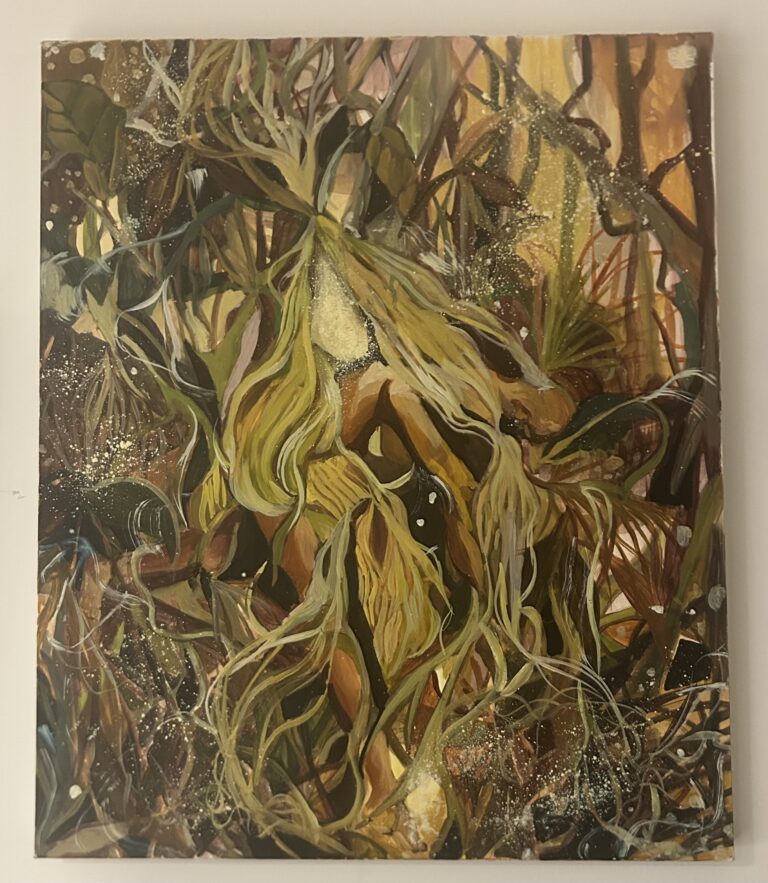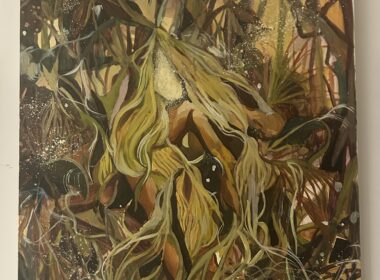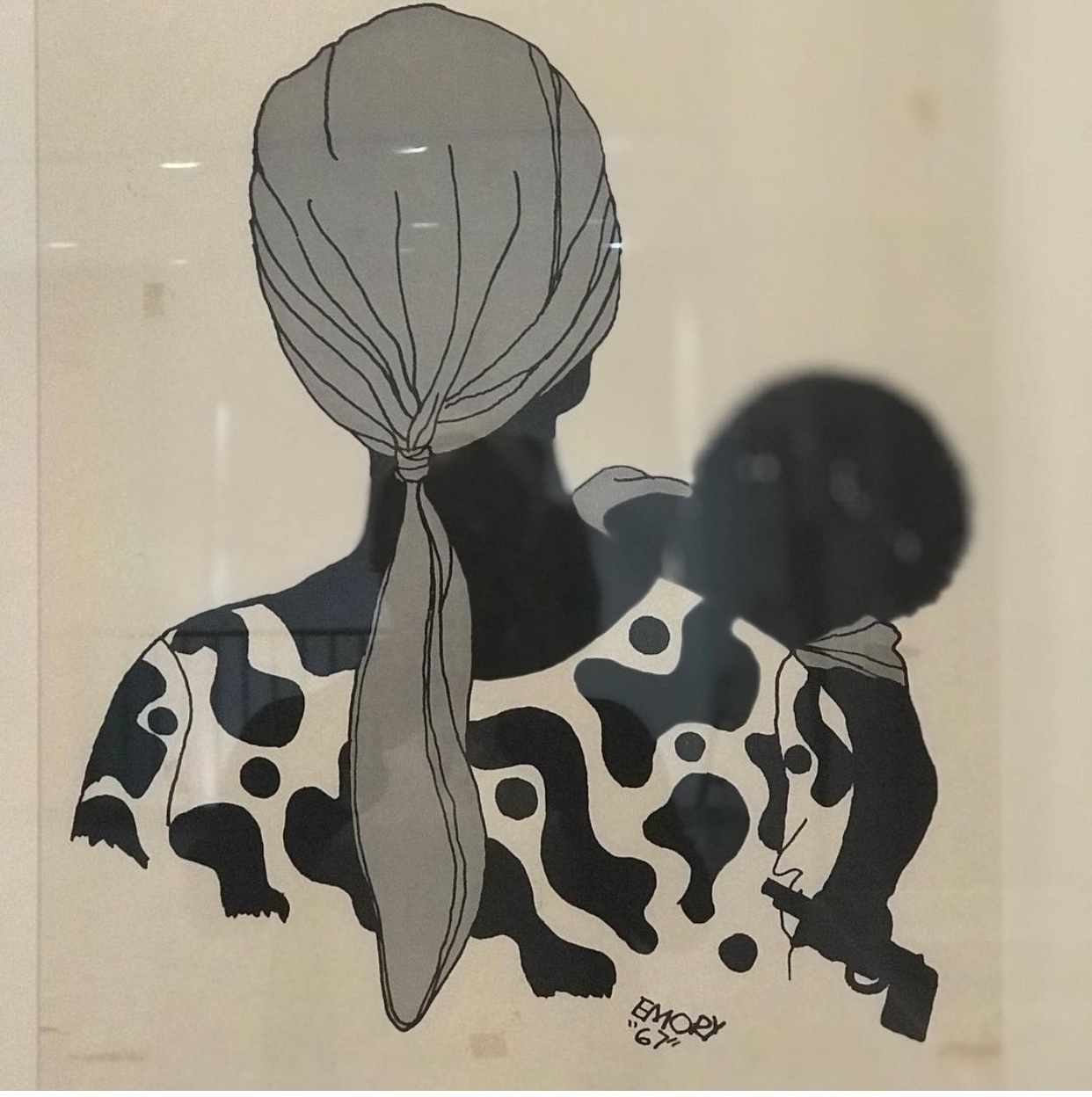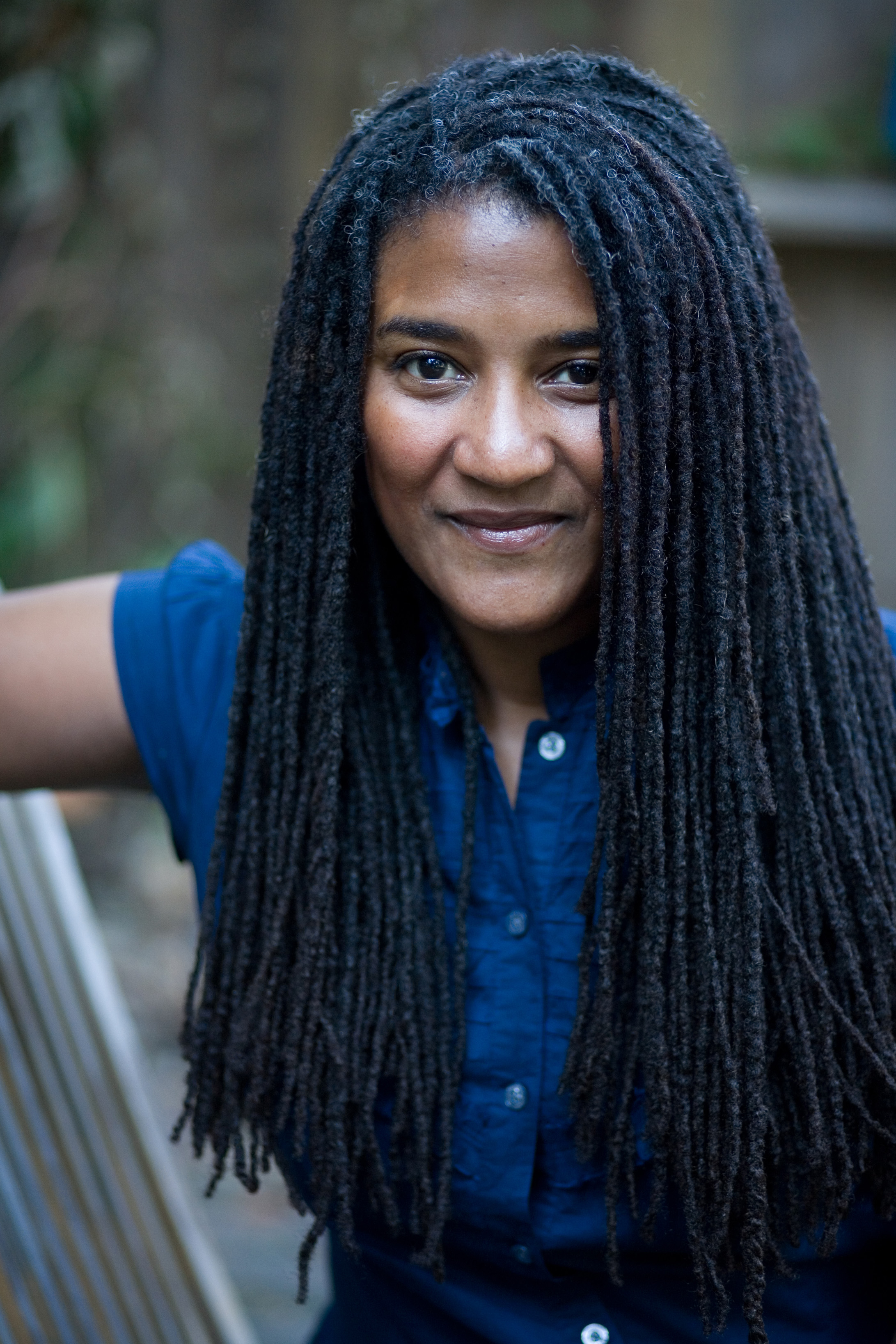Above: Work By Emory Douglas
To celebrate Mother’s Day, Lesley-Ann Brown submitted an excerpt from her book Decolonial Daughter: Letters from a Black Woman to her European Son. In this book, Ms. Brown writes letters to her son about the world he is from and the world he lives in.
What Whispers the Water?
We need to dig and jump into the land we come from; one woman after another, one dream upon the other, calling up who we are.
— Ntozake Shange
Son,
All my life I’ve been curious about those in our family who came before me. Like so many other children, I was born asking questions: Who are we? Why are we here? But as the descendant of a colonised people who were forced to forget their own beginnings through violence, and of a family who came to believe all that empire had taught them, the answers I received were not designed with the intent of empowering little brown girls. As a child, I was greatly disappointed by the answers given to my questions by the adults around me. From the existence of the patriarchal god that was given to me, to the inequalities in gender and race that I had witnessed as a child, it appears no one around me was equipped with any satisfactory answers. I was to understand, however, that children were to be seen and not heard — something I resisted with every breath in my body. In this quest for truth, I picked up reading quite early and discovered alternative ways of being, knowing and living.
I have always had an innate sense that it would be through digging up the stories from the past that I could gain some understanding of life and would so be helped on my way forward, which in turn could push us, more collectively as human beings, off this path of self- destruction that we so evidently seem to be on. Son, we are inventive people, conjuring up paths when others have been denied. What others have attempted to erase is still with us; the waters, if we are still, whisper our stories.
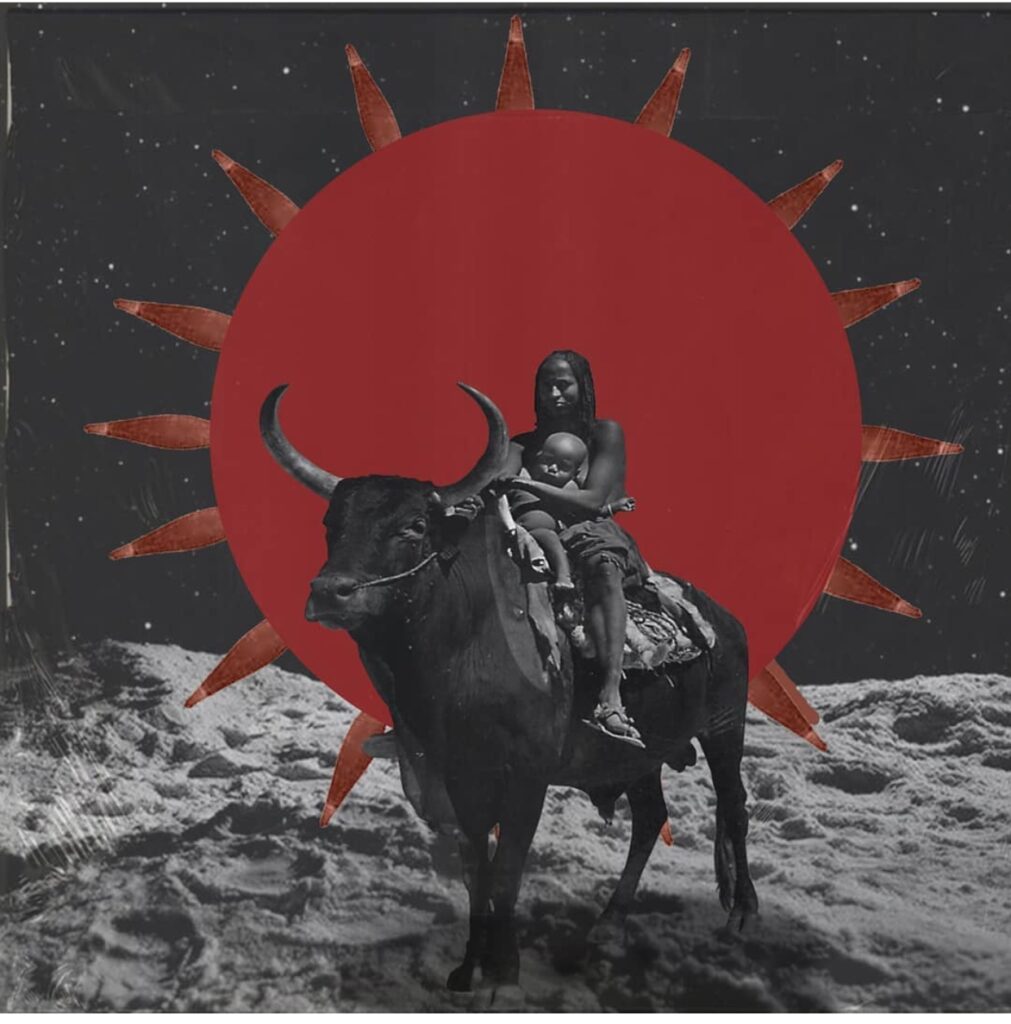
* **
We, son, are island people.
From the twin nation of Trinidad and Tobago to Manhattan and Brooklyn on Long Island, Maui, Zealand in Denmark, islands have always been a part of our lives.
What is a baby in her mother’s womb, if not an island, surrounded by the natal waters that speak in a language of memory? Water is time past, present and future, it is memory, it is thought, it is dreams. And I wonder what it was that was whispered to you, as you grew in the darkness of my womb, surrounded by the water of all waters? What are the stories that were told? Were they stories about loss? Of the joy I felt on learning I was carrying you in my womb? Were they stories of my mother, my grandmother and even those who came before? Did you hear the voices of our ancestors? Your great-great-grandfather’s cry when he entered the world on a boat destined from Chennai to Trinidad? Was it the cries of our kidnapped ancestors from Africa, or the joy of those travelling of their own volition, making paths between this continent and others? Was it the Corsican? Did you hear him? Or the childhood rhymes that I would sing on the pavement in Brooklyn, along with other little brown girls with colourful beads in braids, breath smelling like bubble-gum and singing not-so-innocuous children’s rhymes such as:
Rockin’ Robin,
tweet tweet tweet
Rockin’ Robin,
tweet tweet tweet
All little birds gonna’ really rock tonight
Tweet tweet tweet
Mother’s in the kitchen cookin’ rice
Father’s on the corner shootin’ dice
Brother’s in jail, waitin’ on bail
and Sister on the corner selling fruit cocktail
Rockin’ Robin, tweet tweet tweet
Or was it the blues of Nina Simone? The soca of Sparrow, the calypso of Lord Kitchener or even the jazz of your namesake Thelonious Monk? Did you hear your grandfather’s playing on his Hammond B-3? The jams that I grew up with in Brooklyn, comprised of Trinidadian men, all arriving to Brooklyn with hopeful hearts and the ability to blow a trumpet, play the conga or strum the guitar (but not necessarily possess the ability to survive on this new, foreign terrain)?
Memories whisper to me, from the ocean, through the mist, the wind. It seems fitting that I am here, on the Danish island of Anholt, to write this letter to you. As you know, the kingdom of Denmark — your birthplace — has over four hundred islands. One can say that Anholt is shaped like a bird, a dipper even, and it lies in the dead centre of Kattegat, an ocean that has its own stories, its own histories; surrounded by Sweden, Zealand and Jutland.
It is summertime in Denmark and the weather has been reminiscent of when I first arrived in 1998 — grey and windy and cold. I would quickly come to learn the Danish adage, “There’s no such thing as bad weather, just bad clothing.” Anholt, the island on which I am now, has a terrain a bit similar to Tisvilde. It takes twelve hours to drive to Anholt as opposed to the couple of hours it takes by train to get to Tisvilde from Copenhagen. I love to travel by train throughout Denmark and Europe, and I especially like the journey to Tisvilde. Particularly that part of the route when the small train, grisen (the pig), goes through Gribskov, one of Denmark’s many forests. Back in the day, the train was old and I found the sound of its loud engine comforting. Back then, Denmark seemed to be a quaint trip to the past — but alas, no country is an island, and all nations, no matter their origins, will benefit from an honest reckoning with their past, present and future. But this, of course, rests heavily on the willingness of the people to interrupt their hygge — that culture of cosiness that has even the Anglo world peddling its benefits to their overworked and underpaid North American and British counterparts. It makes sense that hygge is such an institution here given that workers here are so much more protected than in other places in the world. With socialised healthcare and free education (with even private education being subsidised by the government), it makes sense that we can afford to value time with family and friends. And as a friend of mine recently reminded me, it isn’t free! We pay for it with our taxes! I think it’s safe to say that there would be no hygge if not for the social welfare system and the higher standard of living that some claim stems from Denmark’s colonial past.
I do want to take the time to note here, however, that even with Denmark’s strong social welfare programme, things have become more and more challenging for many Danes, and hygge for more and more people is becoming increasingly not so easy to come by. Along with Denmark’s relatively recent love-affair with neoliberal policies have come extreme cuts to social welfare programmes, a “pull yourself up by the bootstraps” mentality, along with a strong belief in non-existent “trickle-down economics.” As you know, I have often taught English courses to many of Denmark’s largest corporations, and I have met many fatigued and stressed workers who are fearful of losing their jobs. It is this fear that is harvested by the right-wing parties who convince the populace that it can all be blamed on immigration, a rallying cry so absurd when one considers the miniscule percentage of immigrants in this country to begin with. Xenophobia is fuelled by bad economies.
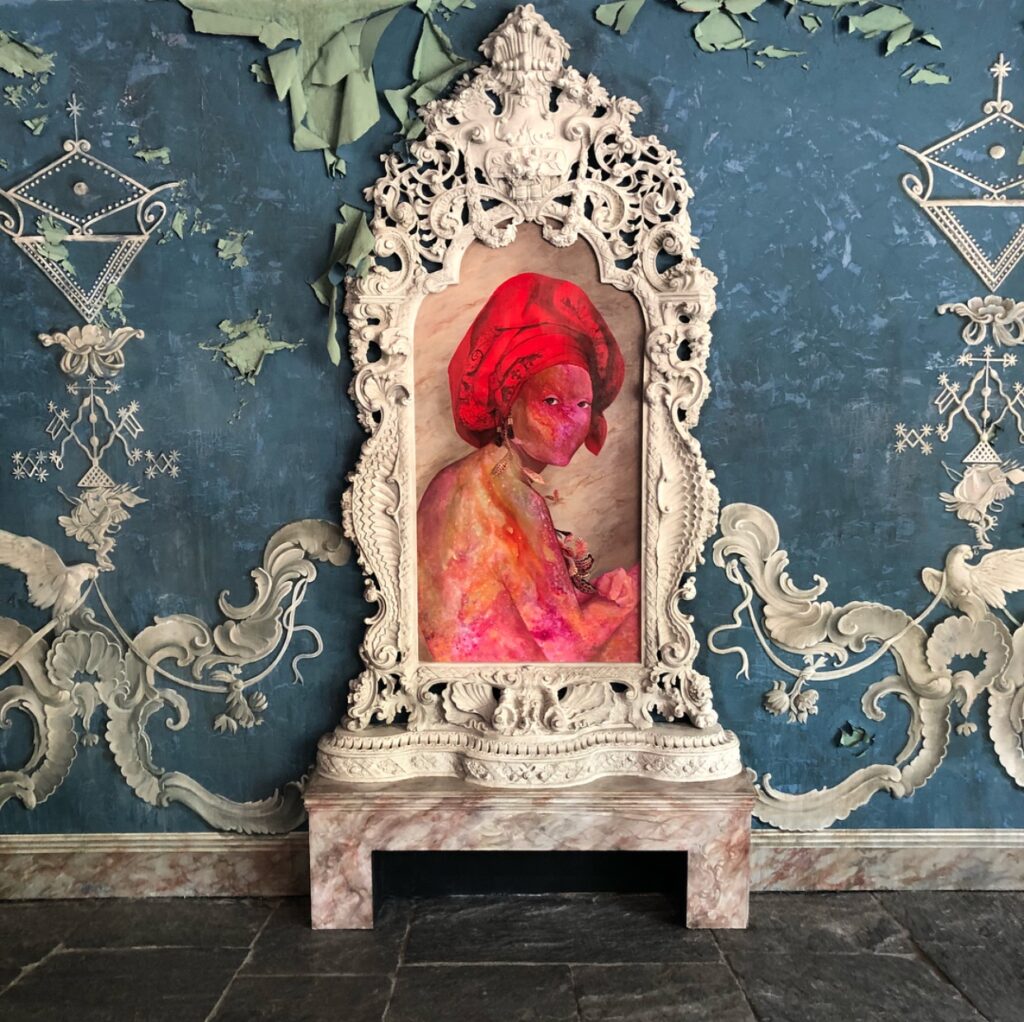
** *
I didn’t travel through Denmark to get to Anholt, however. Instead I flew on a tiny ten- passenger airplane from the former capital of Denmark, Roskilde, and in about forty- five minutes landed on a small runway scattered with grass. Whenever I have the privilege to travel at leisure like this, with the spirit of adventure, I tend to have more patience, and thankfully, have only had positive experiences travelling throughout this country and the rest of Europe. My experiences in Denmark are even more positive now as I know the language enough to get around. And even if my language fails, I often find that most are all too happy to help.
If you’re a foreigner, it’s not that difficult to walk away from the news with the feeling that you’re not wanted here. With the country’s second-largest party being right-wing nationalist, Denmark is indeed at an interesting juncture in how she sees herself in relation to the past, present and future. Considered a leader in maintaining Fortress Europe, how Denmark moves forward is of major importance in relation to borders, migrations, asylum, wars and how it all relates to the rights of freedom of movement.
When I arrived at the small airport in Roskilde, I spied a young couple. An interracial one. They were both Danish, and as they leaned into each other and expressed their attraction to each other in the awkward way the newly- in-love do, I felt comforted by the young lady’s confidence expressed in her laughter, her well-put-together clothes and apparent obliviousness to others. She didn’t fit the bill of what some would say a Dane looks like, but rather defied and challenged the view, like you. The pilot, a man named
Rasmus, was friendly and once seated on the plane passed a plastic container full of liquorice — that Danish staple which usually I detest — but for some reason I took one and, for the first time, enjoyed. Maybe whether one likes liquorice or not should be the qualifier for Danish integration and citizenship?
Anholt has a similar terrain to Tisvilde, but there are some differences. The forest is full of a variety of trees endemic to Northern Europe — spruce, birch, beech and oak. Although both islands have had a history of wandering dunes (Anholt has the only designated desert in Europe), Anholt seems to be heavily populated by scots pine — a tree whose leaves contain even more vitamin C than citrus fruits do. Tisvilde also has lots of pine and is blessed with an abundance of rose-hip bushes, everywhere from its beaches to people’s gardens. Rose hip too is full of vitamin C and I particularly like the jam that is made from it.
The house in which I am staying in Anholt once belonged to an award-winning Danish art director who no longer has memory. The house, on loan, is made of wood and is replete with the seemingly omnipresent Poul Henningsen lamps, a pot-belly oven, and the type of knick- knacks common to summer houses such as glass buoys hanging from the ceiling and an array of life-like objects made from branches, stones and feathers. I later learned these figures are gryle — trolls who live out in the desert here in Anholt and are known to cause mischief — and a creation of the man who once lived here.
The house’s smells of sun-dried clothes, pine and a slight mustiness remind me of Trinidad, Hawaii, Woodstock, New York and a wooden cabin I once lived in in Lutsen, Minnesota.
As I write this you are at the summerhouse in Tisvilde with your father. It has been years since I last visited. Gilleleje, another town on the northern coast of Zealand, is where I spent most of my time when I was pregnant with you. Gilleleje is the location of Søren Kierkegaard’s favourite spot, and when you sit and look out into the Kattegat you cannot help but feel the connection to this ancestor of Denmark. I hope that you go there one day. And if you do, know you were there once in my womb, as I sat on the very spot in which he sat, and looked out into the very body of water upon which he too once did. I wonder what the waters whispered to him?
I have been blessed here in Denmark regarding your father’s family and the various people I have managed to meet and work with in the political and creative sphere. Not that long ago I was invited to a public school in the town of Nivå where I spoke to the ninth-grade students about colonisation. I was together with Garba Diallo, the founder of Crossing Borders, a Danish organisation that promotes intercultural understanding. Through my poetry and other writing, I often get invited to various schools throughout Denmark to speak about colonisation, where I use the story of my family and the history of Trinidad and Tobago to illustrate the many nuances and perspectives of European colonisation. I was truly moved by the students’ engagement and interest. They were overwhelmingly Danish, with a young lady of Turkish descent and a young boy from the Congo being the only two non-white students in the class. Despite this, or perhaps because of this, the class took an active interest in our presentation. I was particularly impressed and hopeful after this experience. It is always beautiful to experience students who meet you with warmth, openness and interest in learning. I say this having had the experience (seldom, true, but still an experience) of adults who are incapable of letting go of their own personal defensiveness when faced with the task of acknowledging history from others’ perspectives.
As you know, I have done quite a lot of work here in the eighteen years that I have been here, with the hopes of facilitating a more open dialogue on issues such as race, gender and migrations. I have people in my life who I trust and who are committed to breaking the patterns of oppression that are all too often repeated, even in spheres of supposed resistance. I have managed to take you with me to Trinidad twice, and we have both been to Berlin, Barcelona, London, Nice, Cannes, Venice and Bologna, among others. Although life has been challenging here, I would be remiss if I did not acknowledge how my American privilege has opened doors for me. Life has been good to me here, and it is in this spirit that I would like to declare that these letters are not only to you my son, but to the country of your birthplace. I hope that there is something useful that can be mined from these pages, not just for you, but for the people whose country I have lived in for over eighteen years, so that in these challenging times, we can move forward in a more pluralistic way as opposed to the mono- narrative and erasure that is so typical of our current knowledge system.
As they say in Trinidad, “What doh kill, fatten,” and certainly my tenure here in Denmark has been boot camp for the soul. There is no better way to confront yourself and the world than in a foreign country, and life, my son, must be examined. I too must examine myself, as I insist on examining history and the geographies that have been etched in my memory through lineage and travel. I too possess the coloniser in my veins, in my body, my mind. I too, must undergo a rigorous introspection that requires that I reckon with the internalisation of colourism, racism, classism, misogyny and sexism.
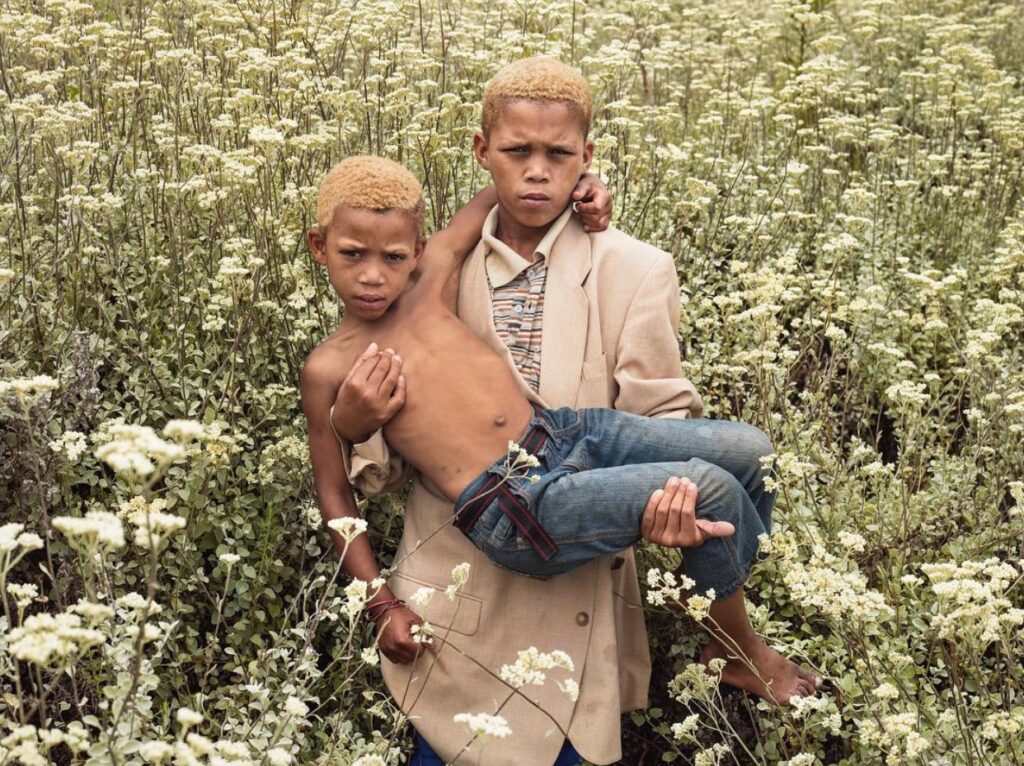
* **
Who taught me to love myself?
What stories does the water tell? What stories were whispered to you when you were in my womb? Did you hear your grandmother, my mother, teaching me to sew flowery doll dresses as I sat on her lap on our leopard-print couch in Brooklyn? Did you hear my grandmother’s laugh, bubbling forth, when I was a child and, after seeing her naked, asked her where could I buy a vagina like hers? Did you hear my father as he guided me through E G B D F and told me how in Trinidad the notes are designated by the words eat good bread dear father and how this would end up being such a profound piece of advice for him in the years during which he would succumb to his demons (perhaps the wrath of our forgotten ancestors?) and, like so many children of empire, fall to the parasite that infiltrates our economic, social, mental and spiritual systems?
** *
Where the political landscape of the world tends to depress me, the countryside speaks a language to me that is soothing and healing. I am stronger now, but part of my journey has involved a mental, spiritual and emotional dis-ease that can unfortunately be a part of facing the legacies of being a product of European colonisation and all that has meant to colonised people the world over. Post-colonial stress syndrome. This includes the anxiety of being around people who think that there is only one narrative. This includes the rage of having strangers invade your personal space and put their hands on you in public places. This includes the violent omission of your ancestors in history books. This includes, for too many, consistently being held out of traditional employment opportunities. This includes the continual racist imagery and language that European power seems to be so dependent upon and that so many are so unwilling to let go, for to do so would usurp whatever ideas of supremacy some so desperately hold on to. Add to this the general ignorance and blatant racism that seem to have boomeranged with a much darker and almost imperceptible force the world over, along with living far from home, and you can perhaps understand a bit the darkness that seemed to have washed over me. But, as one of Denmark’s most famous writers Hans Christian Andersen once advised, going into the darkness is necessary to find the light. Denmark, with her sunless winters, has given me enough darkness, and I have now found the light, which you are such a big part of. It is in the darkness of the Earth’s soil, after all, that seeds take root and grow. It was in the darkness of my womb that your life was ignited and so unfolded. It was in the darkness of the heavens that the universe too was sparked. And for this I am thankful. For nations can be about the people, for sure, but nothing is more universal and encompassing than the land herself. And it is in the land, the earth, no matter where we are in the world, that we will always find salvation.
We live in what can be viewed as perilous times. Our planet is getting warmer at an unprecedented rate and migrations will only continue to grow as the children of former empires are left to deal with the climatic consequences of the industrialism their ancestors and land were exploited for. Hurricanes that are born in the Sahara travel the same routes that our enslaved, brutalised and kidnapped ancestors once sailed. Many claim this is no coincidence. Borders are tightening and US federal departments are censoring the use of the term “climate change.” But there are solutions, son. And many of these solutions can be found outside of the parameters that are currently in place:
Scientists and farmers around the world are pointing out that we can regenerate degraded soils by switching from intensive industrial farming to more ecological methods — not just organic fertiliser, but also no-tillage, composting, and crop rotation. Here’s the brilliant part: as the soils recover, they not only regain their capacity to hold CO2, they begin to actively pull additional CO out of the atmosphere.1
I once read that the land in Denmark is among the most over-farmed in Europe — the land, like its people, is in need of radical healing. We, the children of Earth, must heal, because whatever we have done to the Earth we have done to ourselves. There are those who believe that the land is on loan from our descendants, and there are those who believe that they can rape the land and her resources. There are those who know that there is enough on this planet and there are those who say that there is not enough.
Politics is all about power — and it is not politics that will save us. All you have to do is find yourself surrounded by the wrong activists to learn that there is a difference between those who are fighting for a piece of the pie and those who want to prepare an entirely different dish. There are those who understand that, although it may seem that the sacred has been perverted and that words are devoid of meaning, we live in a world that is still full of wonder and power. You will soon learn, son, if you have not already discovered this, that it is not gender, sexuality, nationality or the colour of skin that will bring people together. To paraphrase the British filmmaker Isaac Julian, you cannot tell someone’s beliefs or politics by the colour of their skin, nationality or even sexuality. No. But I will tell you about “meeting places” — that place where you connect with someone else, that space where your interests intersect — and how once you become clearer and focused about your purpose, these “meeting places” can be cultivated into art and action. You will find that the best way to learn about someone’s character is through the work that they do and not only how they treat you but most importantly how they treat those perceived to be the weakest.
But you know this. You told me the other day about what you found to be the most frustrating aspect of your hearing impairment. You said you just couldn’t stand people who acted like you were stupid because you asked them to repeat themselves to you. While I cannot say that I can ever understand what it means to be hearing-impaired in this world, I am pleased that you see it as a filter. These are the people that you don’t need to waste your time on. And while we’re at it, I want to take the time to commend you for your attitude when you were telling me this story. I love your confidence, son. I love your humour.
It is on this island of Anholt that I am reminded of the beauty here in Denmark. Like Tisvilde and Gilleleje, Anholt too is an old fishing community ravished by the overfishing of industrialised food production. However, these are booming tourist attractions now and the harbours show very little signs of distress. On the contrary. One can still feast on langoustines, shrimp, cod amongst holidaying Danes, Germans and other mostly Northern Europeans.
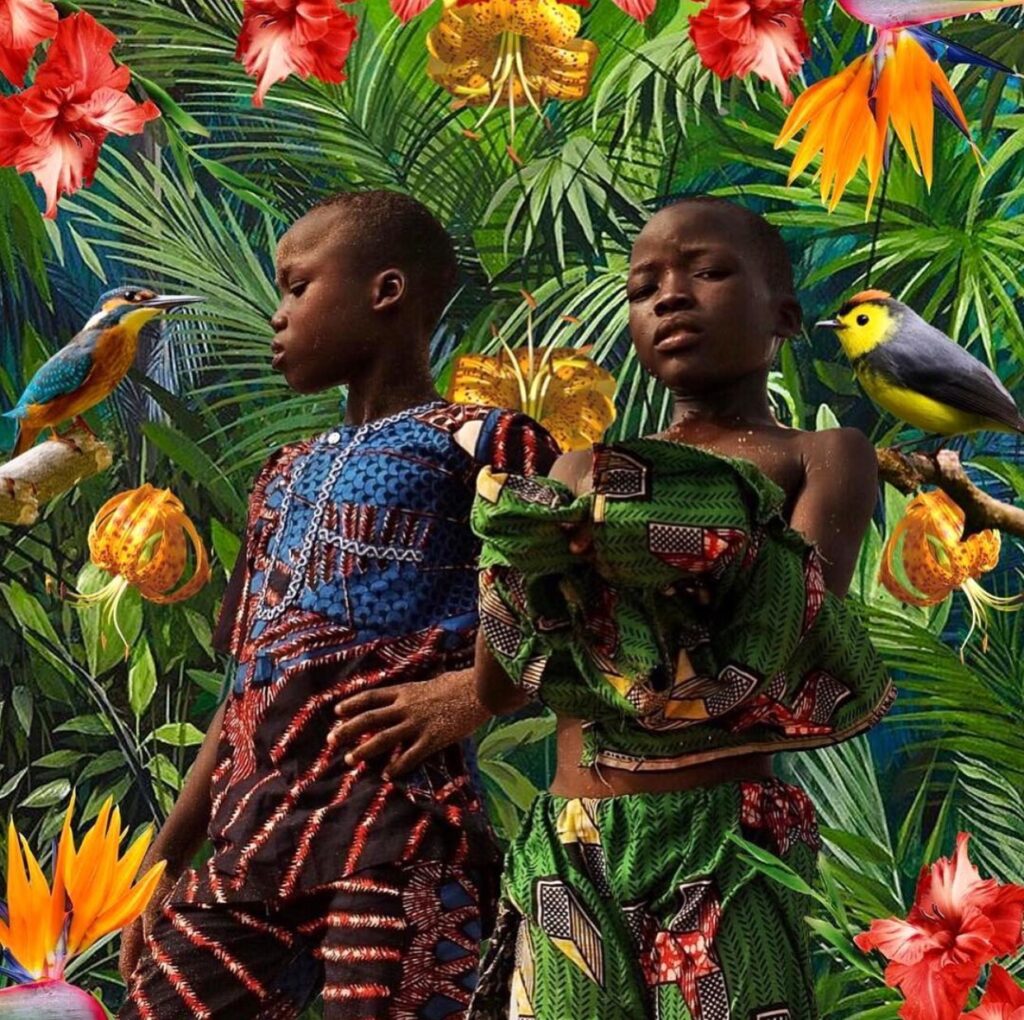
* **
Ultimately, though, we cannot talk about liberation, son, without talking about the land, and as our bodies are made from the very stuff of the earth, I encourage you to look at your skin and not only to decode the book that is written there but also to remember that we are, and always be, children of this universe. No country, no border, no war, no law should ever be allowed to infringe upon this sacred tenet. And in those moments where you may seem to forget, I urge you, son, to make your way to any of the many harbours or coastlines that
surround us on Zealand, and look out to the water. Ask her, what whispers the water? And be still, so that she can tell you.
Brooklyn Is War
Yes, and the body has memory. The physical carriage hauls more than its weight.
— Claudia Rankine, Citizen Son,
Sometimes the war a child is born into is not that of a country, but the one in her own home. Her father is an irate man-child dictator; her mother, the domestic prisoner who ensures that his power is never challenged. This child’s and her siblings’ bodies, the river whose movements must be controlled, must be dammed, prevented from going their own, natural course. Sometimes the very people who are supposed to protect you end up doing you the most harm; sometimes a child’s birth is not welcome — her presence makes demands on the adults around her that economic realities won’t facilitate and besides, how much do you think a little brown girl is worth, anyway? This is the transference of oppression. This is how abuse reproduces itself. This is how seeds of trauma are planted, like landmines sitting in your body undetected until something happens. Something triggers it and you explode. Again and again. Generation after generation… until we return to the land, to the waters, and listen to her and so use this wisdom towards our own liberation. We are told that we are separate from nature. Our culture seems to be anti-nature. We eat her, take from her and attempt to subjugate her. But we are nature, not distant from her.
They say that architecture determines behaviour and I often wonder: What behaviour does the infrastructure of modernity lend itself to? What is the benefit to be had from living in boxes, often one on top of the other as so many buildings in cities around the world are fashioned? And even more importantly, what behaviour does the housing that is often relegated to the poor inspire — from the projects in major US cities, to the council estates of Europe? Tell me son, what do you think it inspires?
* **
Here is a conundrum about life: The longer we live, the closer to death we come.
* **
Our bodies remember that which our minds cannot. The aches and pains that visit us remind us of issues not faced and if we are lucky, if we are in a space where we can dismantle the pain, we can stare our demons down and, like the rebellions of enslaved Africans of old, burn them down with the cleansing power of fire. “Slash and burn” is how the cane fields were worked. Slash and burn: clear the land, start anew.
